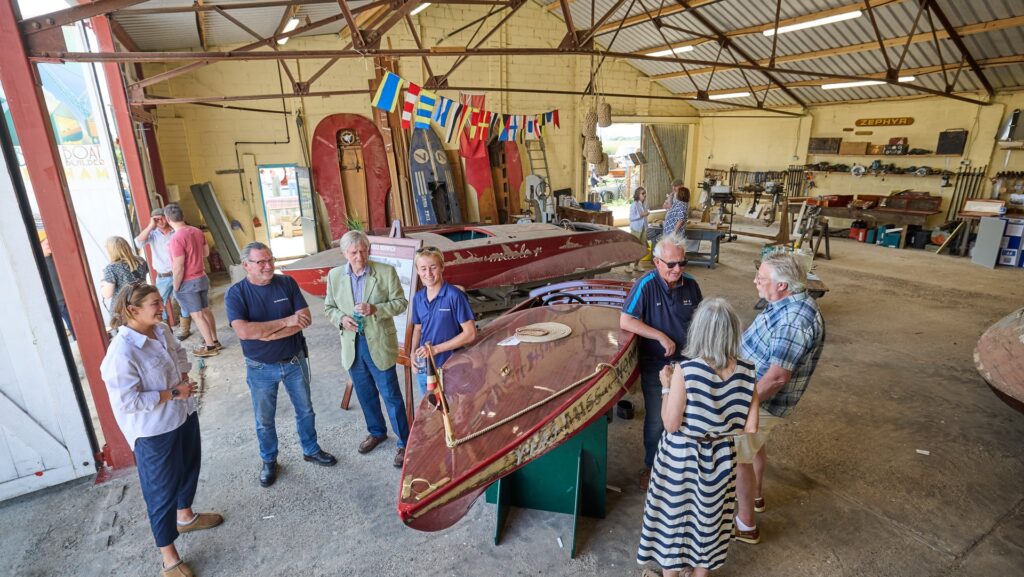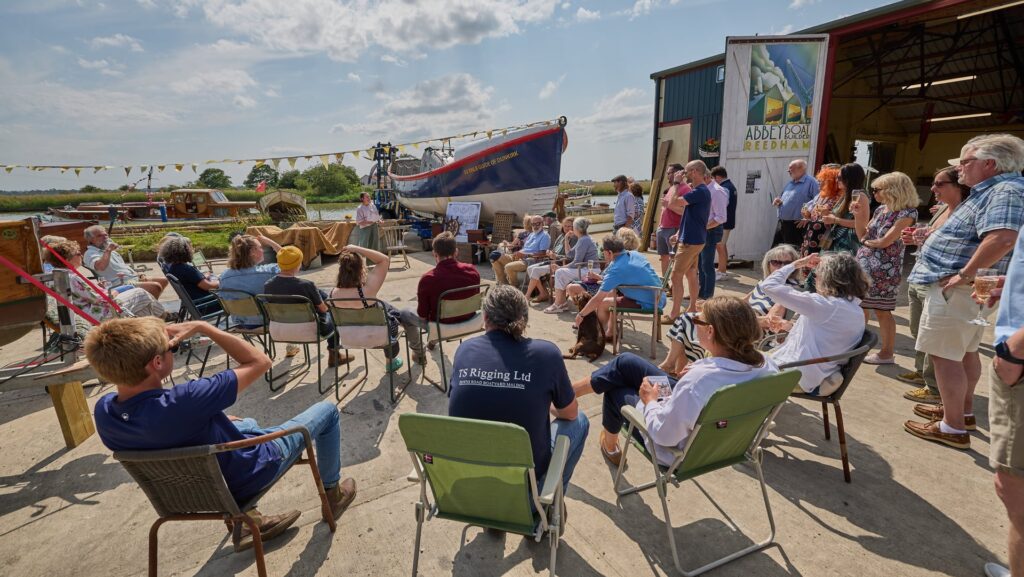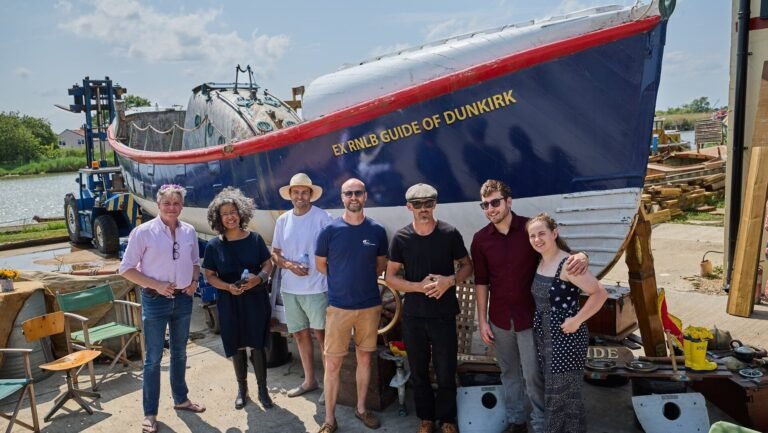More than 60 professionals from the British wooden boatbuilding and heritage marine engineering sectors gathered at a newly expanded riverside boatyard in Reedham, Norfolk, to mark the launch of a new yard opened by Abbey Molyneux, also known as Abbey Boatbuilder.
The event, held on 14 June 2025, brought together industry participants from across the country to discuss the current challenges and future of traditional boatbuilding in the UK.
Molyneux, who set up her yard in Norfolk in 2021, has relocated to a larger site with expanded workshop and storage space, hard-standing areas, a crane and on-site accommodation. Among the boats on display was the Guide of Dunkirk, a vessel associated with the Dunkirk Little Ships. Molyneux has acquired the boat and plans to restore it with a gender-diverse team while offering opportunities for local women and youth to engage with heritage craft and gain practical experience.
The event took place amid concerns about the visibility and support of the traditional boatbuilding sector. Industry figures noted the contrast between Molyneux’s progress and recent reports of yard closures, alongside concerns that national bodies are prioritising naval and GRP export sectors while traditional craftsmanship receives limited attention.
Three major reports in recent years have highlighted the skills shortage in traditional boatbuilding, including work by the Craft Association and Wooden Boat Trade Association, the National Shipbuilding Office and National Historic Ships.
In May 2025, MP Edward Morello addressed these issues in a Westminster debate. Despite this, no coordinated national strategy has emerged to support training and workforce development in the sector.
Molyneux says: “It was truly fantastic to see everyone together. Our industry goes unnoticed and rarely receives positive press or recognition, but it was clear to see from the turnout that our industry is thriving and growing despite the lack of training, support and funding.
“We are all working together to keep these skills alive and to make sure our beautiful industry prospers into the future. We are determined to bring our industry to a wider audience, and with all the support shown after Saturday’s event, we will certainly be making waves in the coming years. Watch this space.”
A collaborative initiative is now being developed to raise the profile of the industry and advocate for traditional skills and materials as part of the marine sector’s future.
Will Reed, director of the Lyme Regis Boat Building Academy, says: “Visiting Abbey’s new yard was inspirational for two reasons: Firstly, Abbey herself is an incredibly talented boatbuilder. She is also driven, forward-thinking, a superb businesswoman, and focused on pulling the traditional boatbuilding world together.
“Secondly, many of the guests travelled for several hours across the country for discussion and debate. There were boatbuilders, yard owners, enthusiasts and educators – all with the common goal of preserving and developing our wonderful industry. The determination to work together in pushing things forward and to shout about the successes was embraced by all.
“For me, of course, the focus is on providing the best possible education to upcoming boatbuilders and feeding the industry. This only works if we have a thriving workforce ready to take our newly qualified boatbuilders on the next leg of their journey.”
Jim Dines, founder of the Heritage Marine Foundation, says: “It was good to see so many like-minded people gathered with the same aims and concerns. Since the restoration of the Cutty Sark, we have been concerned about how we bring more young people into the traditional vessel industry, not just boatbuilders, but riggers, oars and sparmakers, engineers, fabricators and finishers.
“With rigging finally being added to the list of endangered skills, we feel that the threat to these skills is now at least recognised. We need to make the UK aware that there is a shortage of young people entering the industry and to bring it to the attention of young people that there is a viable career path in the industry. The skills learned in conserving, maintaining and operating traditional vessels of all types are transferable across the board into modern vessels, both sail and motor, as well as the commercial industry; this is not the case the other way round.”

Belinda Joslin, founder of Women in Boat Building CIC and a member of the National Shipbuilding Office’s Shadow Board, says: “For two years I’ve been lobbying the National Shipbuilding Office for a response to the placing of traditional boatbuilding on the Red List – they’ve made it clear it’s not their priority but it is ours. We have an ageing skilled workforce, and we need young people to fall in love with the joy of boatbuilding and all its related skill sets.
“People are in this industry because they love it – it’s a lifestyle choice, and a calling. The heritage skills are the heart and soul of our industry, captivating children’s imagination for life. Without young people learning the skills, key parts of our nation’s heritage and culture will literally sink.
The Importance of Collaborative Efforts in Preserving Traditional Boatbuilding Techniques
In a world where technology and innovation are constantly evolving, there is a growing concern about the preservation of traditional boatbuilding techniques. The marine industry is facing a challenge in maintaining the skills and knowledge required to build and repair boats using traditional methods. As a response to this concern, there is a call for collective action among boatyards, colleges, and individuals to work together in preserving these valuable techniques.

Plans for an organised response are now underway, aiming to create a unified voice to preserve traditional techniques and support skills development for future generations. The industry bodies alone may not be doing enough to address this issue, which is why it is crucial for stakeholders to come together and take action.
“So we need to work together as a collective of yards, colleges, individuals – to do what the industry bodies are not doing.”
Collaboration is key in ensuring the survival of traditional boatbuilding techniques. By sharing knowledge, resources, and expertise, stakeholders can work towards a common goal of preserving these valuable skills. This collaborative effort can also help in promoting the importance of traditional boatbuilding in the modern marine industry.
Through networking events, workshops, and training programs, stakeholders can come together to exchange ideas, learn from each other, and support the development of traditional boatbuilding skills. By working together, they can create a strong foundation for the future of traditional boatbuilding and ensure that these techniques are passed down to future generations.
Read more about boatbuilders and boatbuilding
As the marine industry continues to evolve, it is essential to remember the importance of preserving traditional boatbuilding techniques. By working together as a collective, stakeholders can ensure that these valuable skills are not lost to history. Through collaboration and shared efforts, the future of traditional boatbuilding can be secured for generations to come.

